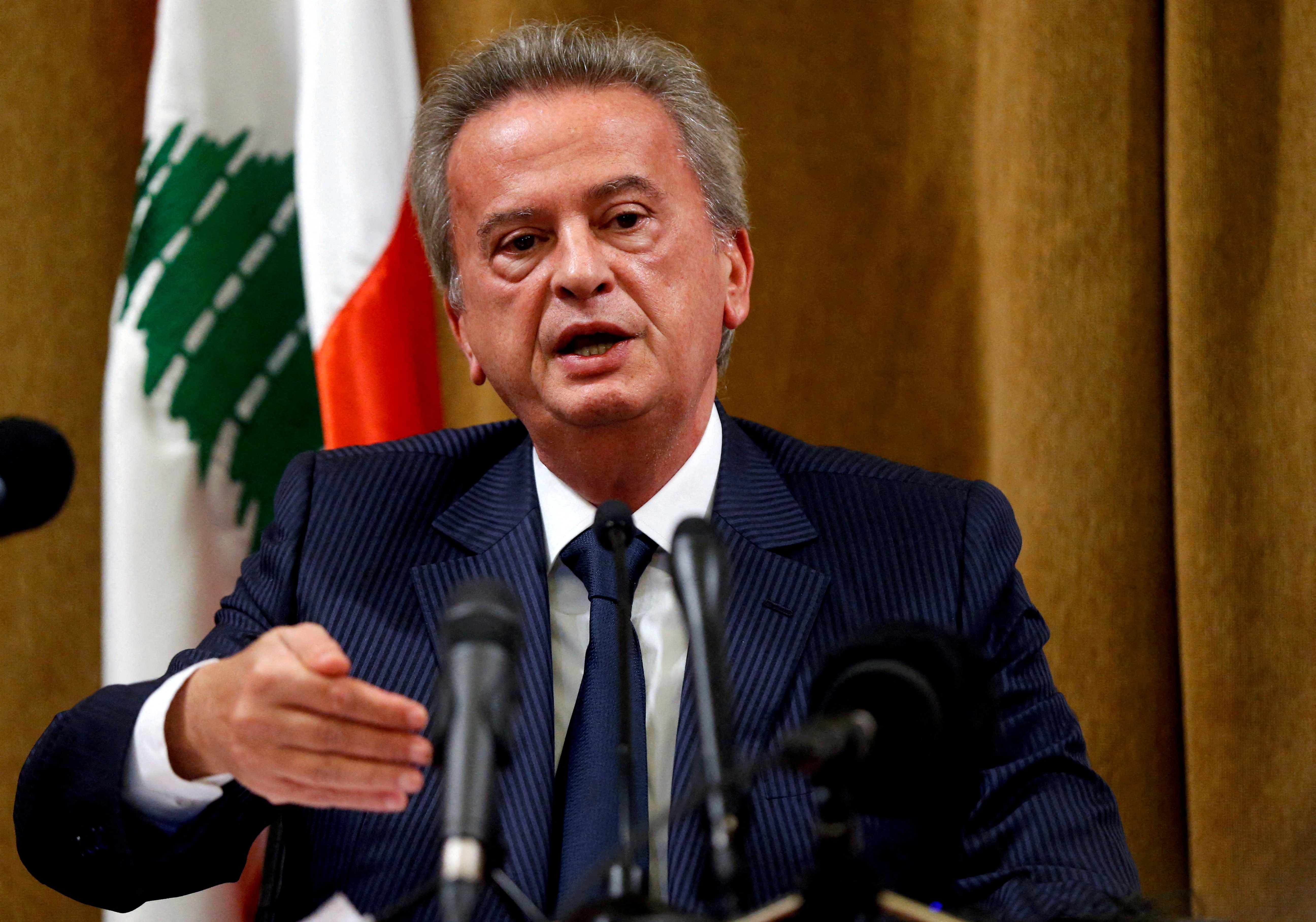
BEIRUT (Reuters) – Riad Salameh, Lebanon’s former central bank governor arrested on Tuesday on fraud charges, was feted as a financial wizard before his image was shredded by corruption cases at home and abroad and the devastating implosion of the banking sector.
Widely viewed as the linchpin of the financial system until it collapsed in 2019, Salameh, 74, saw his standing crumble as the meltdown impoverished Lebanese and froze most savers out of their deposits in the once sprawling banking sector he oversaw.
His reputation was further tarnished as one European country after another began investigating whether he abused his powers to embezzle a fortune of Lebanese public money during his three decades in office.
A senior Lebanese judicial source said he had been arrested on Tuesday over money laundering, fraud and embezzlement charges linked to a Lebanese brokerage firm known as Optimum Invest – one of several investigations he has faced.
Neither Salameh nor his lawyer responded to requests for comments. Optimum’s CEO told Reuters it had carried out a financial audit earlier this year of its interactions with the central bank that found no evidence of wrongdoing by the firm.
The probe is separate to previously announced corruption investigations centred on commissions which the central bank charged banks for the purchase of government securities, the proceeds from which went to Forry Associates, a company controlled by Salameh’s brother, Raja.
Those investigations began with a Swiss probe into whether Salameh and his brother Raja illegally took more than $300 million from the central bank between 2002 and 2015.
The Salameh brothers have previously denied diverting or laundering any public funds and deny any wrongdoing.
Salameh left his post in July 2023, telling Reuters at the time he had “worked according to the law and respected the legal rights of others”.
A month after he left office, the United States, Britain and Canada announced sanctions against Salameh, accusing him of corrupt actions to enrich himself and his associates – accusations he also denied at the time.
French and German authorities also issued warrants for his arrest last year. Interpol Red Notices declared him wanted by both countries. The one issued at the request of France cited charges including organised money laundering. The one issued at Germany’s request also cites a charge of money laundering.
Salameh said last year his lawyers had submitted legal challenges to the warrants in France and Germany.
In June, German authorities cancelled their arrest warrant for Salameh for technical reasons, but were continuing their probe and keeping his assets frozen, the Munich prosecutor’s office told Reuters.
HIGH-LEVEL BACKING
Salameh’s image as a competent steward of the financial system set him apart from the ruling politicians, many of them militia leaders from Lebanon’s 1975-1990 civil war – although he enjoyed high-level backing from them.
His ties to the elite appeared to fray as his tenure came to an end. Asked in an interview with a Lebanese broadcaster before he left office whether the politicians had washed their hands of him, Salameh said: “a long time ago.”
Salameh has defended his tenure, saying he was made a scapegoat for the meltdown and noting that the government – not the central bank – was responsible for spending public funds.
The meltdown followed decades of corruption and profligate state spending by the ruling factions. Many Lebanese hold Salameh and those factions responsible.
It was a dramatic reversal for a man once seen as a possible president. Salameh was a regular at glitzy financial conferences and showered with banking awards, and exercised broad powers as governor.
On Salameh’s watch, savers enjoyed high interest rates, able to convert their pounds into dollars at a fixed exchange rate which he maintained from 1997 until the collapse.
Their confidence was underpinned by his calm demeanour and mantra that their currency was in good shape, as well as Lebanon sailing through the global financial crisis in 2008.
But the national finances began to creak as dollar remittances slowed, putting growing pressure on a system that required constant inflows of hard currency to keep it going.
Salameh kept the system afloat in 2016 by siphoning off dollars from local banks at high interest rates. Critics described this as a “Ponzi scheme” as it depended on fresh borrowing to pay back existing debt.
The central bank has always said the operations were legal. Salameh has rejected the notion BDL operated a Ponzi scheme.